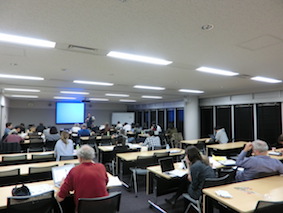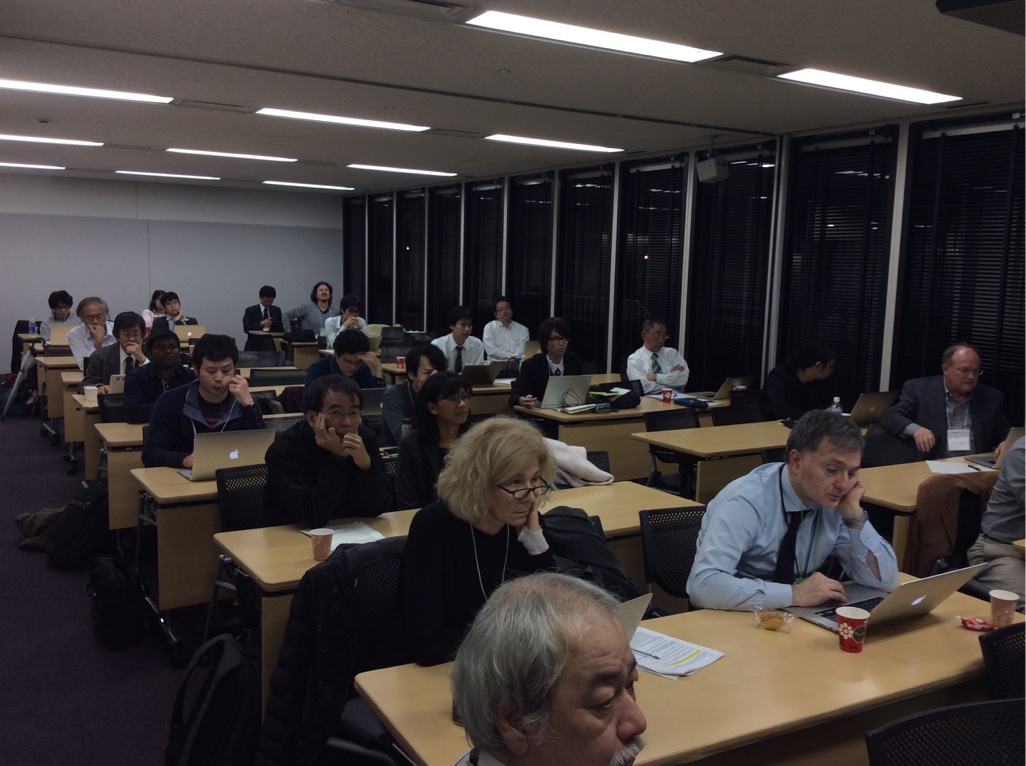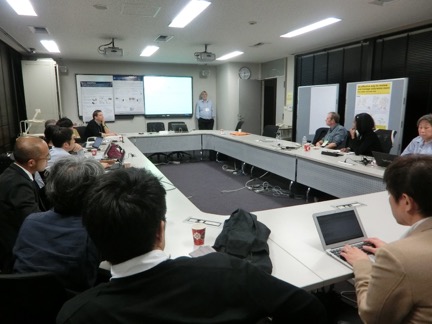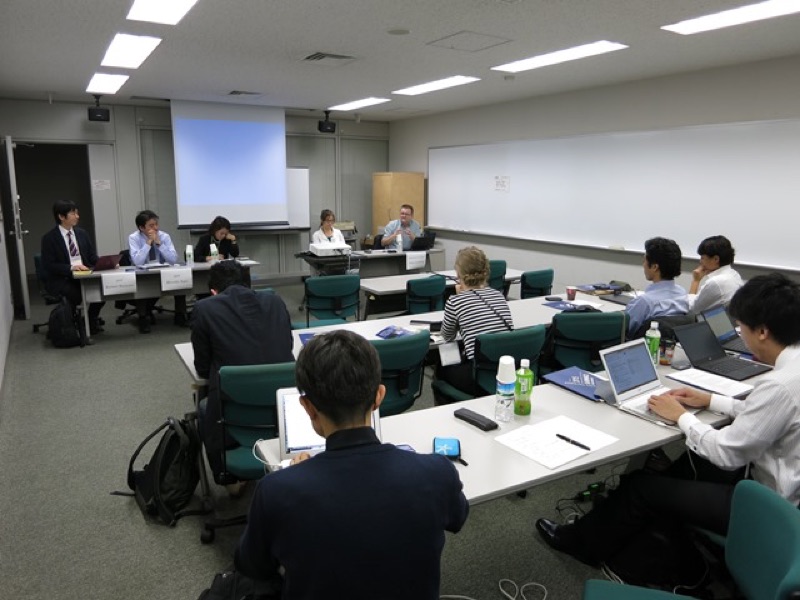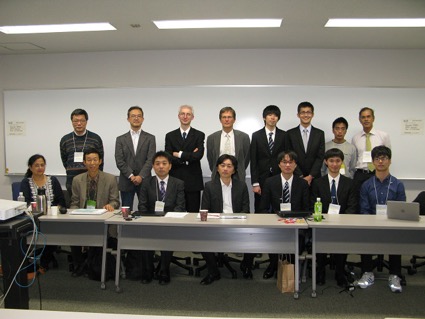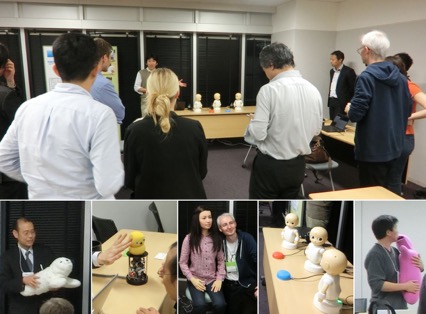<!–
Accepted workshops will be available in April 2015.
Accepted workshops in 2014 is available (Accepted workshops in 2014).
–>
- Workshop 1 : The 12th International Workshop on Logic and Engineering of Natural Language Semantics (LENLS 12)
LENLS is an annual international workshop focusing on formal semantics, formal pragmatics and related fields. We invite submissions to this year’s workshop on topics in formal syntax, formal semantics, formal pragmatics, formal philosophy, and related fields, including: dynamic/categorical/topological/coalgebraic/type-theoretic/substructural approaches.
Organizers: Eric McCready, Daisuke Bekki and Koji Mineshima
Website:
http://www.is.ocha.ac.jp/~bekki/lenls/
Report:
The international workshop Logic and Engineering of Natural Language Semantics (LENLS) was started in 2005. Its purpose is to provide a venue for researchers working on natural language semantics and pragmatics, (formal) philosophy, artificial intelligence and computational linguistics together for discussion and interdisciplinary communication. Over the lifespan of the workshop, whose 12th iteration was held at JSAI-iSAI 2015, many researchers have presented their work, and the workshop has become recognized internationally in the semantics-pragmatics community.
LENLS 12 had five invited speakers and 21 submitted talks. The invited speakers were Nicholas Asher (IRIT-Toulouse/U. Paul Sabatier), who spoke about the analysis of discourse-level phenomena using infinite games of a particular kind,, Robert Henderson (U. Arizona), who talked about a formal semantics of pluractionality and pluractional ideophones, Magdalena Kaufmann (U. Connecticut/Kyoto U./JSPS), who spoke on the semantics of “it depends on” and free choice, Stefan Kaufmann (U. Connecticut/Kyoto U.), who discussed the possibility of a probabilistic semantics for conditionals and unconditionals, and Tomohiro Sakai (Waseda University), who talked about the meaning of proper names. In addition, this year’s LENLS involved a workshop on politeness, at which Daisuke Bekki (Ochanomizu/NII/AIST/JST CREST) and Eric McCready (Aoyama Gakuin U.) also spoke. This wide range of invited talks was interesting and showcased the variety of work done by LENLS participants.
The same was shown by the range of topics discussed by the submitted papers. Here, topics included the semantics of various modal auxiliaries and their relation to adverbials, aspects of categorial grammar formalisms and empirical issues arising therein, complex aspects of type-theoretic semantics, ways of evaluating computational applications, and logical aspects of some inference systems, among many others. Again, the range of topics is characteristic of LENLS. All in all, the workshop was very useful and productive for both organizers and participants.
Chair: Eric McCready (Aoyama Gakuin University)
Co-chair: Daisuke Bekki (Ochanomizu University/NII/AIST/JST CREST)
Koji Mineshima (Ochanomizu University/JST CREST)
- Workshop 2 : Juris-informatics (JURISIN 2015)
Juris-informatics is a new research area which studies legal issues from the perspective of informatics. The purpose of this workshop is to discuss both the fundamental and practical issues for juris-informatics among people from the various backgrounds such as law, social science, information and intelligent technology, logic and philosophy, including the conventional “AI and law” area. We solicit unpublished papers on theories, technologies and applications on juris-informatics.
Organizer: Takehiko Kasahara, Ken Satoh
Website:
http://research.nii.ac.jp/~ksatoh/jurisin2015/
Report:
Juris-informatics is a new research area which studies legal issues from the perspective of informatics. The purpose of this workshop is to discuss both the fundamental and practical issues among people from the various backgrounds such as law, social science, information and intelligent technology, logic and philosophy, including the conventional “AI and law” area. JURISIN 2015 is the 9th International Workshop on Juris-informatics, which is held in association with the International Symposia on AI by Japanese Society of Artificial Intelligence~\\ (JSAI-isAI).
This year, we have twenty one submissions and each paper was reviewed by at least three program committee members and as a result, nineteen papers will be presented at the workshop.
Papers cover logical inference, ontology, natural language processing, information retrieval, and so on. As invited speakers, we have Giovanni Sartor from University of Bologna, Italy, Shiro Kawashima from Doshisha University, Japan, Do Kwan Jo from National Assembly Law Library, Korea and Miyoung Jin Kim, from Justice Law Firm, Korea. Moreover, we have a joint invited speaker, Phan Minh Dung from AIT, Thailand with the 2nd International Workshop on Argument for Agreement and Assurance (AAA 2015).
Following the previous year, JURISIN have a session on the 2nd Competition on Legal Information Extraction/Entailment (COLIEE 2015) which consists of result report of the competition and five papers for each participants.
- Workshop 3 : Workshop 3 : The second workshop on Advanced Methodologies for Bayesian Networks (AMBN 2015)
Probablistic graphical models including Bayesian and Markov networks are being intensively used for modeling variables related each other. On the platform, learning and inference are executed based on the probability law. This symposium intends to discuss advanced approaches to PGMs and explores its applications. The area of the symposium covers structure/parameter learning, causal inference, probablistic inference (belief propagation), logic structures, statistical dynamics approaches, learning theory, applications (genome, social networks, marketing, etc).
Organizers: Joe Suzuki, Maomi Ueno, Takashi Isozaki, Yasuo Tabei
Website:
http://ambn2015.bayesnet.org
Report:
- Workshop 4 : The 2nd International Workshop on Argument for Agreement and Assurance (AAA 2015)
Argument has now become an interdisciplinary research topic receiving much attention from formal logic, informal logic and artificial intelligence. It aims at processing, analyzing and evaluating various aspects of human argument appeared in television, newspapers, WWW, etc. and also artificial arguments constructed from structured knowledge with logical language and rules of inference. Results of the study are widely applicable to various domains such as safety, political, medical and legal domains. In particular, safety engineering appreciates Toulmin’s argument model starting from his critical opinion on formal logic. There is a growing interest in the use of an evidence-based argument often called a safety case, assurance case or dependability case. Nowadays, it is becoming necessary for developing and operating bodies to comply international standards, for system stakeholders to make agreement, for system administrators to achieve accountability. The international workshop on argument for agreement and assurance contributes to deepen mutual understanding among researchers/practitioners in formal and informal logic, artificial intelligence, and safety engineering working on agreement and assurance through argument.
Organizers: Kazuko Takahashi, Kenji Taguchi, Tim Kelly, Hiroyuki Kido
Website:
http://cse.t.u-tokyo.ac.jp/kido/AAA2015/
Report:
The workshop aimed at deepening mutual understanding to explore a new research field among researchers/practitioners in formal and informal logic, artificial intelligence, and safety engineering, working on agreement and assurance through argument. We had about twenty participants; eight presentations, one posters-and-demos presentation, two invited talks (one is in cooperation with JURISIN), and three demonstrations. As the schedule of one-day workshop was a little bit tight, we planned the get-together luncheon and a demonstration session.
- Workshop 5 : Healthy aging tech mashup service, data and people (HAT-MASH 2015)
Ageing of the population cause not only substantial increase of GDP spent on elderly care per year but also societal effects, which impacts not just the health sector. Meanwhile to develop a sustainable social system, the global society envisions a transformation from reactive care to proactive care and from episodic response to continuous monitoring of wellbeing and maintenance. To support this trend, we have to take into account demographic change, changes in the global economy and the development of technologies and therefore a transdisciplinary approach is a must.
The main objective of this workshop is to provide an informal forum to discuss important research questions and practical challenges in healthy aging and elderly care support to promote transdisciplinary approaches. The workshop welcomes researchers, academicians as well as industrial professionals of different but relevant fields from all over the world to present their research results and development activities. The workshop provides opportunities for the participants to exchange new ideas and experiences face to face, to establish research or business network and to find global partners for future collaboration.
The topic includes but not limited to
ICT for Healthy aging
ICT for elderly care support
Service engineering
Computer Supported Cooperative Work in healthcare
Participatory approach
Data mining
Linked Data
Semantic Web
Organizers: Ken Fukuda, Takuichi Nishimura, Hiroyasu Miwa, Kentaro Watanabe
Website:
https://sites.google.com/site/hatmash2015/home
Report:
HAT-MASH 2015 (Healthy Aging Tech mashup service, data and people) was held successfully on the 16th and 17th of November, 2015 as part of the JSAI-isAI workshop series. It was the first international workshop that bridges healthy aging and elderly care technology, information technology and service engineering.
We had two keynote lectures, 13 presentations and one panel discussion. 40 attendees in total were from academia, private sectors and municipalities and three countries.
We would like to thank again to Mr. Jukka Lindberg, Client director, Older people, subscriber services, Hämeenlinna City, Finland for his keynote lecture and panel discussion and Dr. Masahiro Kanno, CEO, Keiju Healthcare System as keynote speaker, and Ms. Seiko Adachi, Executive Head, Social Welfare Corporation Sinko Fukushikai for participating in the panel discussion as a panelist.
- Workshop 6 : Time Series Data Analysis and its Applications (TSDAA 2015)
The objective of this workshop is to bring together researchers, students and scientists from various research areas and to provide them an interdisciplinary and multidisciplinary forum for discussion of different approaches and techniques of time series data analysis and their implementation in various real life applications. Time series data is abundant in nature and their analysis is needed in various fields like medical and health related applications, biometrics or process industry, finance or economic data analysis or weather prediction.
Linear or nonlinear time series analysis has a long history in Statistical and Mathematical Science. It is relatively new in the area of data mining or web mining in which time series text data is involved. An unifying approach to bridge the gap between traditional multivariate time series data analysis with state-of-the-are methodologies of data mining and knowledge extraction from real life time series data (numerical and text) from various sensors will be aimed in the workshop in order to deal with today’s Big data.
Topics to be covered include, but are not limited to,
Time series Analysis and Forecasting: Statistical Methods and Multivariate Analysis
Time series Analysis with Computational Intelligence
Time series Classification and Clustering
Early Classification on Multivariate time series
Time series Dimensionality Reduction Techniques
Similarity Measures for time series
Time series Anomaly Detection
Applications in energy, finance, medical, health, environment, network, social data, transportation, weather etc.
Organizers: Basabi Chakraborty, Goutam Chakraborty, Tetsuji Kuboyama, Masafumi Matsuhara
Website:
http://www.chishiki.soft.iwate-pu.ac.jp/tsdaa2015/
Report:
Organizing Chairs: Basabi Chakraborty, Goutam Chakraborty, Masafumi Matsuhara (Iwate Prefectural University ) and Tetsuji Kuboyama (Gakushuin University)
As a part of the JSAI International Symposia on AI, supported by Japanese Society of Artificial Intelligence, the workshop on Time Series Data Analysis and its Applications (TSDAA 2015) http://www.chishiki.soft.iwate-pu.ac.jp/tsdaa2015/ has been held on 17th November, 2015 in Yagami Campus of Keio University, Yokohama, Kanagawa, Japan. Around 20-25 persons from eight different countries attended this one day workshop.
Time series data is abundant in nature. An unifying approach is needed to bridge the gap between traditional multivariate time series data analysis with state-of-the-art methodologies of data mining from real life time series data (numerical and text) in various applications ranging from medical and health related, biometrics or process industry to finance or economic data analysis or weather prediction. The objective of this workshop was to provide an interdisciplinary forum for discussion of different approaches and techniques of time series data analysis and their implementation in various real life applications.
The workshop comprised of three sessions with 13 presentations including 3 invited lectures. The first session was on Confidence in Time-Series Prediction with 3 presentations and an invited lecture by Prof. Maciej Huk from Department of Computer Science and Management, Wroclaw University of Technology, Wroclaw in Poland. Prof Huk talked about the problem of prediction disbelief of time series applications and proposed methods of avoiding it. The second session was on Applications of Time series Analysis in Medical Data with 3 presentations and an invited lecture by Prof. Keun Ho Ryu from College of Electrical and Computer Engineering, Chungbuk National University, Cheongju, South Korea. Prof. Ryu delivered lecture on Geosemantics knowledge mining model framework in social network media. In the third and final session on Uncertainties in Time series data acquisition, Prof. Cedric Bornand from University of Applied Sciences, Western Switzerland HES-SO, delivered invited lecture on careful simultaneous acquisition of time series data from heterogeneous information sources. In addition, there were 4 presentations in the final session. After the presentation a social gathering event with dinner was organized and 12 participants attended for further discussion and networking with an objective to organize similar event in the next year.
Here is a list of the presentations and the presenters:
- Avoiding time series prediction disbelief: Maciej Huk (Wroclaw University of Technology)
- Analysis on Stock Price Fluctuation due to Flood Disaster using Singular Value Decomposition Method: Yukari Shirota (Gakushuin University)
- Aggregating and Analysing Articles and Comments on a News website: David Ramamonjisoa (Iwate Prefectural University)
- A Comparative Study of Similarity Measures for Time Series Classification: Sho Yoshida (Iwate Prefectural University)
- Geosemantics knowledge mining model framework in social network media: Keun Ho Ryu (Chungbuk National University)
- On Extracting Propagation Patterns from Bacterial Culture Data in Medical Facility Kazuki Nagayama (Kyushu Institute of Technology)
- Performance Evaluation of Contemporary Classification Algorithms for High Risk Patients with Clear Cell Renal Carcinoma. Kwang Ho Park (Chungbuk National University)
- User Specific EEG Probe Minimization for BCI Speller by Eliminating Irrelevant Ones Using Pareto GA: Shigeki Horie (Iwate Prefectural University)
- Simultaneous Acquisition of Heterogeneous Information Sources to Be Processed as Time Series: C´edric Bornand (University of Applied Sciences, Western Switzerland)
- Applicability of a PV Power Output Estimation Method using Low Sampling Rates Kazuhiro Yasunami (The Kansai Electric Power Co., Inc.)
- Prediction of Temperature, Relative Humidity and Carbon Dioxide Concentration in Greenhouse Using Multiple Regression Models :Yu Fu (Chungbuk National University)
- Real-time Anomaly Detection of Continuosly Monitored Bio-signals Like ECG, etc.: Takuya Kamiyama (Iwate Prefectural University)
- Analysis of eye-tracking data to classify the level of reading comprehension: Zong Han Wu (Iwate Prefectural Universities)
- Workshop 7 : Intervention of children with autism spectrum disorders using a humanoid robot (ASD-HR 2015)
Autism spectrum disorders(ASD) can cause lifelong challenges. However, there are a variety of therapeutic and educational approaches, any of which may have educational benefits in some but not all individuals with ASD. Given recent rapid technological advances, it has been argued that specific robotic applications could be effectively harnessed to provide innovative clinical treatments for children with ASD. There have, however, been few exchanges between psychiatrists and robotic researchers. Exchanges between psychiatrists and robotic researchers are now beginning to occur. In this symposium, to promote a world-wide interdisciplinary discussion about the potential robotic applications for ASD fields, pioneering research activities using robots for children with ASD are introduced by psychiatrists and robotics researchers.
Organizers: Yuichiro Yoshikawa, Yoshio Matsumoto
Website:
https://sites.google.com/site/asdhr2015/
Report:
In the first international workshop on Intervention for Children with Autism Spectrum Disorders (ASD) using a Humanoid Robot, we called for presentation of the studies in the interdisciplinary field of research on this topic including both engineering and medicine.
In the workshop, 16 oral presentations including five invited talk were given (nine on 17th Nov while seven on 18th Nov.) and totally 24 participants attend to them. To facilitate communication between researchers in engineering and psychological/medical fields, we asked five pioneering and/or representative researchers in many fields to give us talks on their activities; Dr. Hideki Kojima who is the pioneering researcher on robotic therapy of children with ASD, Dr. Nilanjan Sarkar and Dr. Zackary Warren who leads the group of Vanderbilt University in the engineering and psychological fields, respectively, which is one of the world-leading group on the field of research of children with ASD and humanoid robot, Dr. Taro Muramatsu from the Department of Neuropsychiatry, Keio University School of Medicine as well as Dr .Masutomo Miyao from Donguri Psycho Developmental Clinic for children with developmental disorder. On the same purpose, we also planned the session of “robot demonstration” where participants brought their robots that are used for the studies on this filed. We had five exhibitions of robots; Keepon developed by Dr. Kozima from Miyagi University, an android robot Actroid-F from Advanced Institute of Science and Technology (AIST), table-top humanoid robot CommU from Osaka University, animal type robot Paro from Tokushima University and AIST, and huggable communication media Hugvie from ATR.
In the workshop, we could have fruitful discussion not only on whether such robots give positive effect for children with ASD, but also on the analysis on the necessary features of robots or tendency or types of children with ASD for such possible positive effects as well as the validities of evidences in the previous work. Since the discussion was considered to be very active and fruitful on the future progress, we hope to have the second workshop with more advanced results in the near future.
- Workshop 8 : Skill Sciences (SKL 2015)
Human skills involve well attuned perception and fine motor control, often accompanied by thoughtful planning. The involvement of body, environment, and tools madiating them makes the study of skills unique among researches of human intelligence. The symposium invites reseachers who investigate human skills and provides them with a place for exchange and discussion. The study of skills requires various disciplines to collaborate with each other because the value of skills is not determined solely in terms of efficiency, but calls for consideration of quality. Quality resides in person and often needs to be transferred through apprentice systems. The procedure of validation is strict, but more commplex than scientific activities, where everything needs to be described with data. We are also keen to establishing the theoretical foundation of skill science as well as practical and engineering issues in the study.
Organizers: Tsutomu Fujinami, Masaki Suwa, Mihoko Otake
